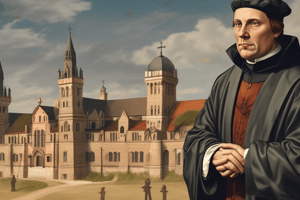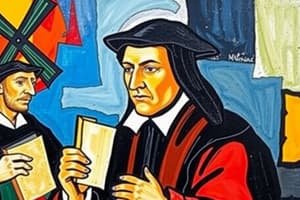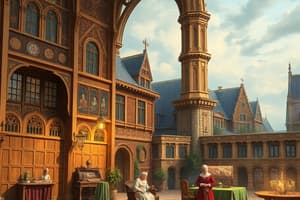Podcast
Questions and Answers
What does the term 'rift' refer to in the context of the church?
What does the term 'rift' refer to in the context of the church?
- A split or serious break in relations (correct)
- A peaceful resolution
- A formal agreement
- A gathering of worshippers
Excommunication is a way to strengthen unity within a congregation.
Excommunication is a way to strengthen unity within a congregation.
False (B)
What is the term used for the rulers from the same family?
What is the term used for the rulers from the same family?
dynasty
The act of arresting or killing people for wrongdoing is known as _____ .
The act of arresting or killing people for wrongdoing is known as _____ .
Match the following terms with their definitions:
Match the following terms with their definitions:
Which of the following best describes 'oppressive' leadership?
Which of the following best describes 'oppressive' leadership?
The term 'to loot' means to give generously to the community.
The term 'to loot' means to give generously to the community.
What does the term 'congregation' refer to?
What does the term 'congregation' refer to?
What was a primary cause of unrest in the Low Countries against Philip II?
What was a primary cause of unrest in the Low Countries against Philip II?
The Duke of Alva was sent to the Netherlands to reward the citizens for their loyalty.
The Duke of Alva was sent to the Netherlands to reward the citizens for their loyalty.
What were hagenpreken?
What were hagenpreken?
The __________ of 1576 demanded the withdrawal of the Spanish army from the Netherlands.
The __________ of 1576 demanded the withdrawal of the Spanish army from the Netherlands.
Match the events or concepts with their descriptions:
Match the events or concepts with their descriptions:
Why did the capture of Den Briel inspire other cities?
Why did the capture of Den Briel inspire other cities?
The Spanish Fury was caused by the Spanish king's inability to pay his soldiers.
The Spanish Fury was caused by the Spanish king's inability to pay his soldiers.
What was one consequence of the Iconoclastic Outbreak?
What was one consequence of the Iconoclastic Outbreak?
Many noblemen fled the Low Countries to escape the cruelty of the __________.
Many noblemen fled the Low Countries to escape the cruelty of the __________.
What was a result of the Pacification of Ghent not lasting long?
What was a result of the Pacification of Ghent not lasting long?
What is an indulgence?
What is an indulgence?
The Pope was supportive of Martin Luther's criticisms of the Catholic Church.
The Pope was supportive of Martin Luther's criticisms of the Catholic Church.
Who ruled over the Low Countries on behalf of the king in 1550?
Who ruled over the Low Countries on behalf of the king in 1550?
The _____ was a decree that allowed the prosecution of Protestants in the Low Countries.
The _____ was a decree that allowed the prosecution of Protestants in the Low Countries.
Which of the following was NOT a criticism that Martin Luther had against the Catholic Church?
Which of the following was NOT a criticism that Martin Luther had against the Catholic Church?
Both Calvinists and Lutherans were against the selling of indulgences.
Both Calvinists and Lutherans were against the selling of indulgences.
What was the main goal of Charles V regarding religion in his empire?
What was the main goal of Charles V regarding religion in his empire?
The _____ was a letter from Dutch nobles appealing for mercy towards Protestants.
The _____ was a letter from Dutch nobles appealing for mercy towards Protestants.
Who succeeded Charles V as the ruler in the Low Countries?
Who succeeded Charles V as the ruler in the Low Countries?
Individualism was a cultural reason that led to criticism of the Catholic Church.
Individualism was a cultural reason that led to criticism of the Catholic Church.
What were the main differences between Calvinism and Lutheranism regarding the governance of the church?
What were the main differences between Calvinism and Lutheranism regarding the governance of the church?
The _____ was a group of rebels who fled to sea during the Dutch Revolt.
The _____ was a group of rebels who fled to sea during the Dutch Revolt.
What ultimately led to the Iconoclastic Outbreak?
What ultimately led to the Iconoclastic Outbreak?
The Spanish Fury involved Spanish soldiers robbing due to lack of funds from the king.
The Spanish Fury involved Spanish soldiers robbing due to lack of funds from the king.
Flashcards
Rift
Rift
A serious disagreement or break in relations between people or groups.
Institution
Institution
An organization with a specific purpose, often a large-scale one.
Discontent
Discontent
A state of dissatisfaction or unhappiness, often about a situation or event.
Sins
Sins
Signup and view all the flashcards
Dynasty
Dynasty
Signup and view all the flashcards
Domestic Affairs
Domestic Affairs
Signup and view all the flashcards
Foreign Affairs
Foreign Affairs
Signup and view all the flashcards
Congregation
Congregation
Signup and view all the flashcards
Act of Abjuration
Act of Abjuration
Signup and view all the flashcards
Dutch Republic
Dutch Republic
Signup and view all the flashcards
Hagenpreken
Hagenpreken
Signup and view all the flashcards
Iconoclastic Outbreak
Iconoclastic Outbreak
Signup and view all the flashcards
Duke of Alva's Rule
Duke of Alva's Rule
Signup and view all the flashcards
Council of Blood
Council of Blood
Signup and view all the flashcards
Tenth Coin
Tenth Coin
Signup and view all the flashcards
Capture of Den Briel
Capture of Den Briel
Signup and view all the flashcards
Pacification of Ghent
Pacification of Ghent
Signup and view all the flashcards
Pacification of Ghent's Goals
Pacification of Ghent's Goals
Signup and view all the flashcards
Religious Peace
Religious Peace
Signup and view all the flashcards
Act of Abjuration Significance
Act of Abjuration Significance
Signup and view all the flashcards
Who is the Pope?
Who is the Pope?
Signup and view all the flashcards
What is a Bishop?
What is a Bishop?
Signup and view all the flashcards
What are Indulgences?
What are Indulgences?
Signup and view all the flashcards
What is the Reformation?
What is the Reformation?
Signup and view all the flashcards
Who is a Heretic?
Who is a Heretic?
Signup and view all the flashcards
What is a Roman Catholic?
What is a Roman Catholic?
Signup and view all the flashcards
Who is a Protestant?
Who is a Protestant?
Signup and view all the flashcards
What is a Gewest?
What is a Gewest?
Signup and view all the flashcards
Who is a Stadhouder?
Who is a Stadhouder?
Signup and view all the flashcards
What is a Privilege?
What is a Privilege?
Signup and view all the flashcards
What is a State?
What is a State?
Signup and view all the flashcards
What is the Dutch Revolt?
What is the Dutch Revolt?
Signup and view all the flashcards
What is the Nobleman's Petition?
What is the Nobleman's Petition?
Signup and view all the flashcards
What is a Hagepreken?
What is a Hagepreken?
Signup and view all the flashcards
What is the Inquisition?
What is the Inquisition?
Signup and view all the flashcards
Study Notes
Reformation & Dutch Revolt
-
Church Rift: Dissatisfaction with the Catholic Church, stemming from perceived abuses like the sale of indulgences, fueled the Reformation. A hierarchy exists; Pope directs Bishops, who control priests.
-
Luther's Criticism: Martin Luther criticized various aspects of the Church, including the sale of indulgences, excessive papal rule, clergy hypocrisy, lavish spending, depiction of saints, and plans for St. Peter's Basilica.
-
Papal Response: The Pope rejected Luther's critiques, excommunicating him and his followers. Charles V, the Holy Roman Emperor, also took action through the Edict of Blood, which authorized the persecution of Protestants.
-
Charles V's Empire: Charles V ruled a vast empire, including Spain, the Netherlands, and parts of Italy and Germany. Maintaining religious unity and centralizing Dutch governance were major goals.
-
Dutch Discontent: The Dutch provinces, with their unique privileges (gewesten), fiercely opposed centralizing policies.
-
Reformation in the Netherlands: Calvinism gained widespread support in the Netherlands, diverging from Lutheranism in certain theological tenets. Both rejected papal authority and indulgences. Calvinism, with its emphasis on congregational governance rather than a hierarchical one, resonated deeply with Dutch culture.
-
Edict of Blood: Charles V's edict aimed to ensure Catholicism in his realm through the persecution of Protestants by the Inquisition.
-
Philip II's Succession: Philip II succeeded Charles V as ruler of the Low Countries.
Turbulent Uprising
-
Noblemen's Petition: Dutch nobles petitioned Philip II to treat Protestants more leniently, leading to temporary lessening of persecutions.
-
Hagenpreken and Iconoclastic Outbreak: Open-air Protestant services (hagenpreken) fostered discontent and led to the destruction of Catholic imagery and property.
-
Duke of Alba's Actions: Philip II responded by sending the Duke of Alba to the Netherlands to suppress the rebellion. Alba's policies included severe punishments (Council of Blood) and a new 10% tax (tenth coin), causing great anger.
-
Dutch Revolt: The Netherlands revolted against Spanish rule due to Philip II's harsh policies, high taxes, and centralization efforts.
-
Den Briel Capture: The capture of Den Briel further inspired revolt as cities, seeking freedom from taxes, joined the resistance.
-
Pacification of Ghent: Faced with the Spanish Fury (Spanish soldiers' plundering), the 17 provinces united against Spain to demand their expulsion.
-
Act of Abjuration: The northern provinces declared independence from Philip II and formed the Dutch Republic.
Studying That Suits You
Use AI to generate personalized quizzes and flashcards to suit your learning preferences.




